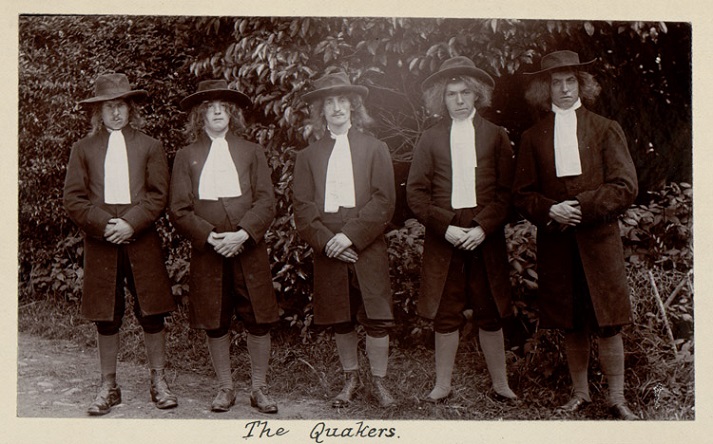Contributor: Elephango Editors. Lesson ID: 11974
Meet the peaceful rebels who helped shape America—without firing a shot.

Imagine walking into a church, expecting a sermon, and instead finding a silent room full of people just… sitting. No one is preaching. No one is leading.
You might wonder if you’ve stepped into the wrong place—until someone stands up to speak from the heart. Then another. And then silence again.
That’s a traditional Quaker meeting.
Quakers, or the Society of Friends, were anything but typical. They challenged authority, refused to fight in wars, and treated everyone—men, women, enslaved people, and Native Americans—with equal dignity.
In a time when most people went along with the status quo, the Quakers shook things up. And although they never had huge numbers, their beliefs helped shape the values of an entire nation.
Find out how.
Who Were the Quakers, Really?

The Birth of a Movement
The story starts in 17th-century England, a place buzzing with religious unrest. Churches had strict rules, leaders had power, and many people felt that religion had lost its meaning.
One of them was George Fox, born in 1624. He didn’t believe a church or priest was needed to connect with God. Instead, he felt every person had an “inner light”—a spark of truth and goodness from within.
Fox walked across England, sharing this message. He preached in fields, challenged ministers, and often landed in jail.

His followers were initially called Quakers as an insult because they sometimes trembled (“quaked”) when moved by the spirit. But they owned the name, and it stuck.
Spreading to America
By the 1650s, Quakers began crossing the Atlantic to find places to live and worship freely. In England, they were often jailed or beaten for their beliefs. In America, they still faced persecution—until William Penn came along.
Penn, himself a Quaker, received land from the British king to settle a colony in North America. That colony became Pennsylvania, a name that means “Penn’s Woods.”

But it wasn’t just a gift. It was a bold experiment: a colony based on tolerance, peace, and fairness. Penn invited people of all faiths to live there, promising religious freedom in a time when that was rare.
Beliefs That Shaped a Nation
Though Quakers were Christian, their actions were guided by values that reached beyond religion. Their meetings were quiet. They didn’t believe in flashy ceremonies or church buildings.
They believed in living simply and honestly and treating everyone with equal respect.

Look at how these ideas played out in early America.
Women and Equality
Long before women had the right to vote, Quaker women could speak in meetings, preach, and even become leaders in the community.
People like Lucretia Mott, a Quaker minister, helped start the women’s rights movement in the United States.
Pacifism and Peace
Quakers refused to fight. They wouldn’t join armies or carry weapons, even during the Revolutionary War.
That didn’t mean they were passive. Instead, they worked to solve problems peacefully and help those harmed by violence. Some Quakers even acted as mediators during conflicts.
Slavery and Freedom
Quakers were among the first groups to publicly oppose slavery. In 1688—nearly a century before it became a national issue—Quakers in Pennsylvania issued a formal protest against slavery.
Over time, many Quakers became active in the abolitionist movement, with some helping to operate stops on the Underground Railroad.
Simple Living
Quakers rejected wealth, showiness, and materialism. They wore plain clothes, avoided titles like “Mr.” or “Mrs.,” and believed actions spoke louder than words.
Their lifestyle was about living with purpose and clarity, not impressing others.

Child Rearing
Quakers treated children with more respect and kindness than was typical at the time. While many believed children should be ruled with strict discipline, Quakers focused on education, moral example, and emotional development.
Respect for Native Americans
William Penn and many Quakers believed that Native Americans deserved fair treatment and honest negotiations. Penn insisted on buying land through agreements rather than taking it by force. He even learned Native languages to communicate clearly.
A Lasting Legacy

Even though Quakers were never a large group, their ideas—like religious freedom, gender equality, and nonviolence—became deeply woven into American culture. Many of their early beliefs, once considered radical, are now widely accepted.
Their influence can be seen today in the Constitution, civil rights movements, and even peaceful protests.
Now that you’ve got a solid understanding of who the Quakers were and how they helped shape American values, it’s time to take a closer look.
Review what you’ve learned and connect those big ideas to real examples from history. Head to the Got It? section!